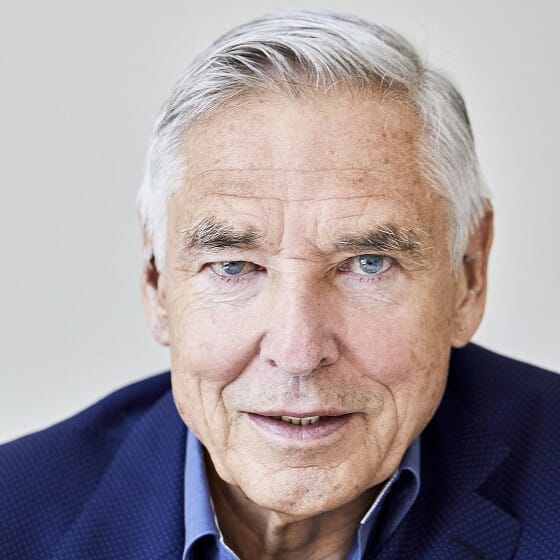
By Elke Porter | WBN News Global | April 24, 2025
The Transition at the World Economic Forum: A New Era Ahead?
On April 21, 2025, the World Economic Forum (WEF) announced a significant leadership transition. Klaus Schwab, the longstanding Chairman of the Board of Trustees, informed the organization of his decision to step down as he approaches his 88th year.
At an extraordinary board meeting held the previous day, the Board unanimously appointed Vice Chairman 81-year old Peter Brabeck-Letmathe as Chairman ad interim. The Board expressed gratitude for Schwab’s 55 years of dedicated service in founding and leading the WEF, which has become a pivotal platform for global dialogue.
Peter Brabeck-Letmathe, born in 1944 in Austria, is a prominent businessman known for his past tenure as CEO and Chairman of Nestlé. He carries notoriety for advocating controversial views, such as his stance on water privatization, which he articulated in the documentary We Feed the World, where he argued against the idea of water being a universal human right.
His position as interim chair has invited scrutiny, especially given recent criticisms of the WEF for allegedly promoting corporate interests over national sovereignty. This perception is magnified by Brabeck-Letmathe's extensive ties with influential corporate networks.
Historically, the World Economic Forum was born out of a CIA-funded Harvard program headed by Dr. Henry Kissinger and attended, in the late 1960s, by a young Klaus Schwab. Similar to the CIA-funded “Congress for Cultural Freedom”, Kissinger’s International Seminar and the later World Economic Forum were Cold War initiatives aimed at educating and coordinating Western political and economic leaders and improving the public perception of capitalism and globalization.
The World Economic Forum (WEF) engages prominent figures such as Mark Carney, former Governor of the Bank of England and current Canadian Prime Minister, who assumed office in March 2025 after winning the Liberal Party leadership. Former Prime Minister Justin Trudeau, who resigned in January 2025, was previously involved in WEF activities, including as a Young Global Leader, highlighting the organization’s ties to Canadian political leadership. Influential business leaders like Microsoft founder Bill Gates also participate, representing the engagement of established global figures in WEF discussions on issues like health, climate, and economic governance.
The World Economic Forum’s Young Global Leaders (2004–2023) and Global Leaders for Tomorrow (1993–2003) programs have included notable figures such as Lachlan Murdoch, CEO of Fox Corporation (selected in 1997), Mark Zuckerberg, founder and CEO of Facebook (selected in 2009), Chrystia Freeland, Canadian Deputy Prime Minister and WEF Board of Trustees member (selected in 2000), and Jagmeet Singh, leader of Canada’s New Democratic Party (selected in 2018). Alexander Soros, son of George Soros, was also selected as a Young Global Leader in 2018, as confirmed by WEF records.
Critiques surrounding the WEF often cite its elite connections and the portrayal of its annual Davos summit as a gathering of the world's most powerful individuals, discussing policies that may favour corporate agendas. As a central figure in this environment, Brabeck-Letmathe's leadership is under watchful scrutiny.
The WEF, which boasts over 1,000 member companies, has the goal of fostering public-private cooperation to tackle pressing global challenges. However, it is often criticized for its perceived lack of transparency and inclusivity, with some arguing it reinforces socio-economic inequalities rather than addressing them.
During his leadership, Klaus Schwab's contributions shaped the WEF into a crucial player in global governance discussions. The need for inclusive dialogue remains critical as the world undergoes rapid transformations.
The World Economic Forum (WEF) is undergoing a leadership transition following the resignation of its founder, Klaus Schwab, as chairman in April 2025. Speculation about Klaus Schwab’s son, Olivier M. Schwab, a former Managing Director, assuming a leadership role has surfaced due to the Schwab family’s historical influence, with Klaus’s wife, Hilde, involved in the WEF’s foundation and his daughter, Nicole, serving on the executive committee.
However, Olivier’s recent departure from the WEF alongside other executives suggests he is unlikely to take on a prominent role. The WEF board has appointed Peter Brabeck-Letmathe as interim chairman and established a Search Committee to select a permanent chair by January 2027, while continuing to facilitate global discussions on issues like climate and economic governance.
Klaus Schwab, the founder of the World Economic Forum (WEF), has led a distinguished career marked by significant contributions to global economic and social discourse. His heritage, rooted in German-Jewish descent, enriches his personal narrative, particularly when viewed through the historical lens of his family’s experiences during World War II.
Born in Ravensburg, Germany, in 1938, to Eugen Wilhelm Schwab, a Swiss-German industrialist, and Erika Epprecht, Schwab’s upbringing in a region shaped by complex historical events adds depth to his story as a global leader committed to fostering international collaboration.
The WEF continues to be a pivotal organization on the world stage, committed to its mission of fostering collaboration among leaders across sectors to meet the challenges faced today and in the future.
#World Economic Forum, #Leadership Transition, #Global Dialogue, #Peter Brabeck Letmathe, #Klaus Schwab, #Future Of Economics #WBN News Global #Elke Porter
Connect with Elke at Westcoast German Media or on LinkedIn: Elke Porter or contact her on WhatsApp: +1 604 828 8788

